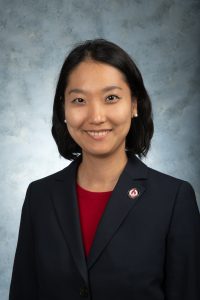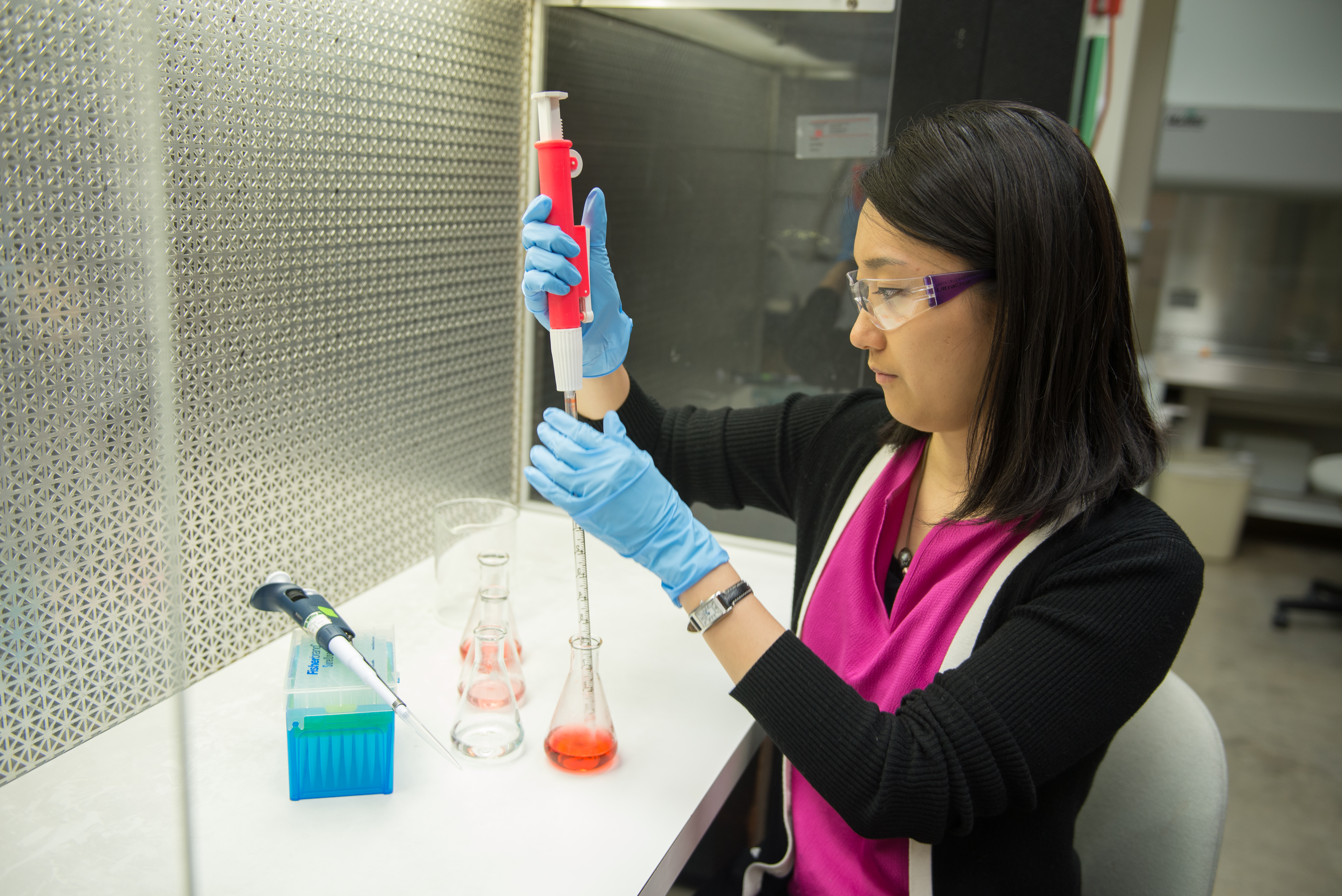For Seon Yoon Chung, Ph.D., the newly minted associate dean for Academics at Illinois State University’s Mennonite College of Nursing (MCN), it all boils down to the people.
Born in South Korea, Chung spent much of her young life in Singapore. Her father’s work took the family there, and she remembers her first day of first grade.
“I remember being surrounded by people who look differently than me, who spoke differently than me. They gave us a worksheet with an alphabet that looked like circles. It was English, but I didn’t read English yet. I filled in the blanks with circles because that’s what it looked like,” she said.
Chung spent the first–ninth grades in Singapore, where classes were taught in English. She describes her childhood as both multicultural and multinational.

Seon Yoon Chung, Ph.D.
“The people of Singapore are mostly Malaysian, but you also have Chinese Malaysians, and people from India, Europe, and the West. Every morning before school, we sang the national anthem in Malaysian and said the pledge in English. I was exposed to so many different people, from so many different places.”
Chung’s friends were from all around the world; she even learned to speak Chinese. She believes she was fortunate to grow up in an environment that celebrated unity and respect for differences—which is perhaps why Chung finds Mennonite College of Nursing, a college rooted in caring and compassion with a 100-year history of service to the vulnerable and underserved, so compelling.
“What I really got from my life in Singapore is that we are each unique, with different perspectives and thoughts. There should not be such a thing as bias or prejudice; that uniqueness is a strength that should be celebrated. I still remember Singapore’s pledge. It goes, ‘We, the citizens of Singapore, pledge ourselves as one united people, regardless of race, language or religion, to build a democratic society, based on justice and equality, so as to achieve happiness, prosperity and progress for our nation.’ I find those words, and that emphasis on unity, so powerful.”
Chung’s family returned to Korea when she was in the 10th grade. She immediately set to the task of relearning in Korean everything she had already learned in English.
“I spent high school studying. I had to figure out how to translate everything I already knew back to Korean so that I could score well on the SAT. It was tough,” she laughs. “Getting into college is very competitive in Korea, so there is a lot of pressure.”
” Seon Yoon Chung describes her childhood as both multicultural and multinational.”
Fortunately, Chung did get into college, and a prestigious one. She earned her bachelor’s degree in nursing from Ewha Womans University College of Nursing in Seoul, Korea, and then started working in the Department of Nephrology at ASAN Medical Center. She returned to Ewha for her master’s after realizing that she could make a larger impact—ultimately, supporting more people—with an advanced degree.
“I have always had a lot of questions; I think that is what drew me to research. Research is ingrained in life—you have a question, and you try to find an answer in a systematic way. My master’s thesis was in nursing informatics competency for practicing nurses in Korea. Informatics was widely happening as hospitals modernized. There were state-of-the-art technology and tools, but nobody was studying nursing informatics in Korea. I wanted to know why.”
Chung’s advisor for her master’s thesis was Kyung Rim Shin, Ed.D., RN, FAAN.
“I was really fortunate to be able to work with Dr. Shin. Over the course of our history together, she was the dean for the Ewha College of Nursing, then Ewha’s vice president for Academics, and then the president of the Korean Nurses Association. She later ran for and became a member of congress, and I went with her to Capitol Hill,” says Chung.
On Capitol Hill, Chung learned firsthand what it takes to build interdisciplinary policy, and what it means to be a leader.
“The biggest thing I took away is that leadership is really about service. As a leader, you are really serving everyone—you need to be in that mindset or you cannot be successful. As a leader, people come to you for answers, and you can answer from experience or you can do research. I think good leaders are just better able to find the right data to answer a question in a systematic way, and then offer a solution for people to consider,” she reflects. “It is not an easy job. It takes dedication, and in some ways, a lot of sacrifice. You have to have that passion, that willingness to serve, that dedication to answer everyone’s questions, to do the work. You have to be willing to find the answers.”
In 2012 Chung came to the United States to earn her Ph.D. in nursing at the University of Maryland. She wanted to serve more people in a bigger way, and that drew her to academia.
“She wanted to serve more people in a bigger way and that drew her to academia.”
“In the classroom, we touch the lives of not just one patient, one family, but an entire group of future nurses. Those nurses go out into the world and touch so many people. The impact is exponential,” she explains.
It was at Maryland where Chung found her research passion: gastrointestinal microbiota.
“I worked as a graduate assistant for Drs. Mary Regan and Jacques Ravel, NIH-funded researchers who were looking at the influence of diet on vaginal microbiota and preterm birth. While exploring the literature, I realized the power of the gut microbiota, and its influence on health in so many areas. As a nephrology nurse, I was exposed to the adverse symptoms experienced by patients on dialysis. I wanted to know if those symptoms were linked to, or affected by, gut microbiota.”
Among her many achievements, Chung has received a Nursing Faculty Fellowship from the Maryland Higher Education Commission, the Intramural Research Training Award from the National Institute of Nursing Research and a Nurse Educator Scholarship from the Harvard Center for Medical Simulation.
After graduating with her Ph.D. in 2016, Chung found herself at Illinois State University for the first time as an assistant professor. She fell in love with the college, the people at Illinois State, and the Bloomington-Normal community. Family took her back to the East Coast in 2018, but just a year later, Chung has returned to Illinois State as the associate dean for Academics for Mennonite College of Nursing.
“Until now, I never considered a career in administration. In the past, I think I said no to leadership positions because, having had firsthand experience of what leadership was like, I knew a little too much about what it takes to be a leader—the responsibilities and sacrifice that comes with the position.”
So what changed?
“I’m here because it was MCN. This place is different.”
“I’m here because it was MCN. This place is different. I care deeply about this college and felt cared for here. The people, the culture, the history. I felt like I could contribute something—that here, I would be able to support the faculty, the staff, and students and make a difference.”
Part of that “difference” has to do with her vision for the future—a vision that builds on MCN’s 100-year history of excellence.
“Health care is changing drastically, both in the practice setting and in the nursing education arena. My vision is to build a firm foundation for us to lead academically in the discipline of nursing for the next 100 years.”
In the end, that is the legacy of MCN. It is, and has always been, an organization composed of people who choose to spend their lives working passionately in pursuit of a brighter future. And for Chung, returning to MCN was, in a way, like coming home.
“I would not have considered this position anywhere else. MCN changed my mind, and it brought me back.”

